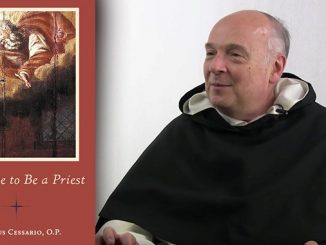
Rome, Italy, Apr 18, 2018 / 11:53 am (CNA/EWTN News).- One of the leading organizers of this year’s World Meeting of Families has said the gathering aims to show the world that living the Christian ideal of marriage and family life is not impossible, but is something realistic that can be attained.
“Our message about marriage and family, about fidelity, that God loves you personally, that human life is sacred from the first moment of conception until the moment of death, that chastity is possible for our young people,” is a message often seen as out-of-date, Archbishop Eamon Martin of Armagh said.
Yet these messages “are achievable for people today,” he said.
“Sometimes people present the Church as being completely out of touch, but actually the Church is hugely in touch. It just wants to keep challenging people to the joy of the Gospel.”
Archbishop Martin spoke to CNA April 18 about the upcoming World Meeting of Families, which is slated to take place in Dublin Aug. 21-26.
Pope Francis will be present at the event Aug. 25-26, where he will preside over the “festival of families” and the closing Mass.
The World Meeting of Families is meant to share “the idea that family is good news, that it is a joyful message, that family is possible,” he said.
We too often “forget the huge number of families who continue faithfully to try to live out a life of love and a life of understanding and commitment to one another in very difficult or challenging circumstances,” he said.
Families, he said, are the first place where people learn to go outside of themselves through compromise and sacrifice, which goes against the individualistic mentality of global society.
“Very few families can survive individualism,” he said, explaining that one’s approach to family life has to start from the perspective of love and joy, which are the heart of the Gospel.
This in turn raises questions about how much social, political and legislative support is available to families, and how challenges can arise if this support is not given.
“Why is it that so many young people will choose not to get married? Maybe because they can’t get a hold of a mortgage, or because the benefit system suits them better to live as single people rather than as a couple with their children. Why is it that legislation on issues like addictions, gambling, or a whole lot of areas where family life can be destroyed, why are these not priorities in social policy-making?”
So in addition to focusing on the Gospel vision of the family, the “harder edge” of the global gathering in August will focus on how families can be supported from all levels of the Church and of society.
Some 16,000 people have registered for the event, most of whom are from overseas, Martin said.
And as the date gets closer, organizers on the ground are starting to “ratchet up” the preparations at a faster pace.
“This is an opportunity for families to meet families from other parts of the world and to learn from each other and to share with one another how we do it; how do we actually survive as a family in this crazy, complicated world,” Martin said.
Excitement is building and Ireland is ready to give the pope and the world “a hundred thousands of welcomes,” he said, using a colloquial Irish saying.
Martin said the gathering will be a time for families to come together and share their experiences, their hopes, and their challenges, without sugar-coating anything.
Acknowledging that no family is perfect, “we’re not in any way trying to romanticize family love,” he said. Rather, the goal is to share the Christian vision of the family, based on hope and love, and to welcome families who are distant or who perhaps don’t feel welcome, he said.
“The word ‘welcome’ is important,” he said, adding that for him, it is sad to hear when people say that for whatever reason, they do not feel entirely welcome in the Church.
And this goes not only for “these neuralgic issues, for example LGBT people or people living in second unions … I’m talking about people who think the Church’s vision of the family is completely out of touch with reality,” Martin said.
“I would love to think that we can talk about ways of welcoming families, welcoming people who … feel that they don’t measure up, or feel that unless their family is perfect, that everyone in their family is living a perfectly holy life, that they are not welcome,” he said.
To this end, he pointed to Gaudete et exsultate, Pope Francis’ exhortation on the call to holiness in today’s world, saying example of holiness can be found in “your mom, your grandmother, your dad. People who struggled but lived as best they could a faithful life.”
“So I think that when we think about reaching out, sometimes we think they are people way out on the margins, but often they are people who are simply trying to struggle to live a good family life everyday and who feel that somehow the Church presents an impossible ideal.”
 […]
[…]










